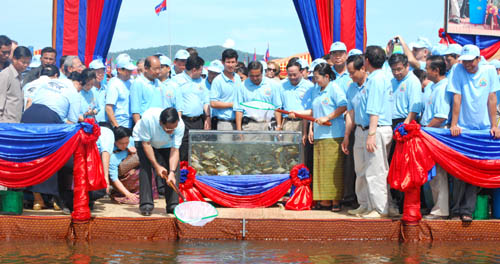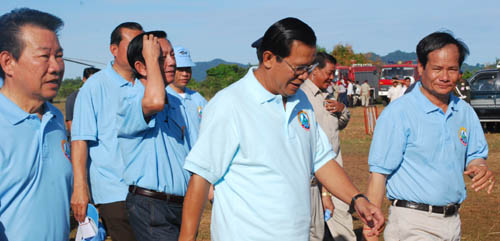Hun Sen appeals for local support in cracking down on illegal fishing
By Peter Starr *
In his annual National Fish Day address, the Cambodian prime minister also calls for "firm measures" against people who destroy flooded forests and concrete steps to reforest such areas. At the same time, he noted that other serious threats to fisheries included dam construction, the digging of canals for illegal land ownership and population resettlement.

Prime Minister Hun Sen (left) and Deputy
Prime Minister Men Sam An (right) using hand-held
scoop nets to release fish into the Veal Vong Reservoir on July
1 as ministers, senior government
officials and international guests look on
Photo: Lem Chamnap
Cambodian Prime Minister Hun Sen and numerous cabinet ministers celebrated National Fish Day in Kep province this year with the release of one million fish and other aquatic animals including prawns, turtles and frogs into a local reservoir. Broadcast on national television, the two-hour ceremony took place on July 1 at Veal Vong reservoir in Domnak Chang Ar district with thousands of people gathered on the site of a former Japanese airfield close to the Vietnamese border.
'We must prepare fields for growing inundated trees'
'Dramatic changes'
In a speech, the prime minister asserted that Cambodia's natural
resources, especially fishery and forestry resources, had undergone
"dramatic changes" over the past five years. "The
number of fishermen has increased rapidly," he said, noting
that Cambodia now had an estimated 1.4 million full-time fishermen
and about 6 million people engaged in related activities and
part-time fishing. Accompanied by limited knowledge of modern
fisheries technologies and limited public awareness of the importance
of natural resources, the environment, regulations and the concept
of sustainable development, the surge in numbers is leading
to the depletion of aquatic and resources. Moreover, the rapid
increase in the number of people fishing "is still the main
constraint to achieving the policy of sustainable use and development
of the fishery resource and other natural resources."
'Anarchic actions'
Samdech Hun Sen said fisheries are a "priority sector"
in government efforts to promote agricultural production in
terms of quantity, quality, competitiveness and efficiency.
"Along with that, we have recognised that the inundated
forest is the life of fishery sector," he said. "Without
the inundated forest, we cannot be rich in fishes." Moreover,
rapid population along the Tonle Sap River and Mekong River
has led to overfishing "which is seriously threatening
the types of fishes which are economically vital." Other
"anarchic actions" have led to the loss and degradation
of refuge habitats. "The building of dams, digging of canals
for illegal land ownership, resettlement, the transformation
of the forest land into agricultural land, the burning of natural
forest and the increase in illegal fishing pressure are ...
the most serious threatening factors."

Prime Minister Hun Sen arriving in Kep
on July 1 with Agriculture, Forestry and Fisheries
Minister Chan Sarun (left) and Fisheries Administration Director
General Nao Thuok (right)
Photo: Lem Chamnap
With the aim of cracking down on illegal fishing and related offenses, the prime minister urged government officials not to forget cooperation from local authorities and joint reports from people to the authorities concerned. "We have to continue to preserve the conservation areas appropriately, and continue to curb illegal fishing and take all measures to cooperate with relevant agencies to comprehensively prevent those highly dangerous fishing offenses such as the use of electric instruments and nets," he said. The prime minister also called for "firm measures" against people who destroy flooded forest areas, particularly around the Tonle Sap Lake. Maps should be created to identify flooded forests, people should be educated about their importance and the flooded forests should be protected. "They are very vital for the fishery sector," he said. "At the same time, we must prepare fields for growing inundated trees and set up (an) annual ceremony for replanting inundated trees." To help prevent annual fires, "we should also consider the building of paths inside the inundated forest."
'We have to safeguard fish spawning areas'
Among other recommendations, Samdech Hun Sen urged government officials to promote smallscale family fish farming across the country by encouraging farmers to dig small ponds. He also called for the establishment of community fish ponds at the village and commune levels and the creation of fish sanctuaries in community fisheries, public fishing grounds and private fishing lots. "We have to safeguard fish spawning areas," he said. At the same time, government agencies have to make utmost efforts to collect revenues from fisheries, taking "strong measures" against fishing lot owners who violate agreements and falsify record books.
In a separate speech, Agriculture, Forestry and Fisheries Minister Chan Sarun stressed the importance of developing aquaculture and community fisheries across Cambodia while cracking down on illegal fishing. He also highlighted the importance of researching the livelihoods of those involved in fisheries while protecting and conserving fishery resources in a sustainable way.
Small species catch down, large species
catch up
The minister noted that last year's fishing season was marked
by declining catches of small low-value species like the Siamese
mud carp (Henicorhynchus siamensis), the lesser silver
mud carp (Henicorhynchus lobatus) and the lesser bighead
carp (Thynnichthys thynnoides). Compared with previous
years, however, there were increased catches of large high-value
species such as the soldier river barb (Cycloceilichthys
enoplos), the striped snakehead (Channa striata),
the giant snakehead (Channa micropeltes), the small-scale
croaker (Boesemania microlepis) and the clown featherback (Chitala
ornata).
Overall fisheries production amounted to about 471,000 tonnes last year comprising 365,000 tonnes from freshwater catches, 66,000 tonnes from marine catches and 40,000 tonnes from aquaculture. "Fisheries production could meet the demand of the majority of the population and the excess was exported to international markets," the minister said. In terms of political recognition, the Seventh National Fish Day was by far the most high profile ever with nine ministers taking part including Deputy Prime Minister Men Sam An as well as Senior Ministers Mok Mareth, who is also the environment minister, and Cham Prasidh, who is minister of commerce. Apart from Chan Sarun, other ministers included Water Resources and Meteorology Minister Lim Kean Hour, who also chairs the Cambodian National Mekong Committee, Rural Development Minister Chea Sophara, Information Minister Khieu Kanharith, Post and Telecommunications Minister So Khun and Industry, Mines and Energy Minister Suy Sem. Ambassadors and other foreign guests from Brunei, Denmark, Hungary, Japan, South Korea, Lao PDR and Malaysia also joined the fish-release ceremony, along with representatives of the MRC Fisheries Programme and the WorldFish Center.
The fish released into Veal Vong reservoir were mainly cyprinid species, notably Siamese mud carp, Hoeven's carp (Leptobarbus hoevenii), Java barbs (Barbonymus gonionotus), pelagic river carp (Paralaubuca typus) and small-scale mud carp (Cirrhinus microlepis). Other species included marbled gobies (Oxyeleotris marmorata), a highly-prized fish which is often exported live to Chinese restaurants in Hong Kong and Singapore, and giant freshwater prawns (Macrobrachium rosenbergii).
Amid growing awareness of the importance of fisheries to the Cambodian economy, Samdech Hun Sen has presided over most National Fish Day ceremonies since the event was held in Kampong Speu province in 2003. National ceremonies have since been held in Kandal province in 2004, Prey Veng province in 2005, Sihanoukville municipality in 2006, Takeo province in 2007 and Kampong Chhnang province in 2008. Over the past four years, smaller fish-release ceremonies have also taken place at the commune level, often involving senior politicians including politburo members from the ruling Cambodian People's Party.
* Mr Starr is the editor of Catch and Culture

Choose a newsletter: